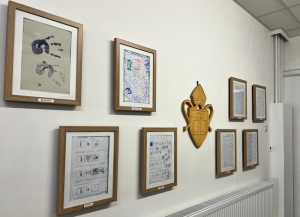Writing at St Matthias
EYFS
In the Early Years, in order to meet the Early Learning Goals for writing, we focus on developing a combination of phonological knowledge and fine and gross motor skills. We do this through teaching phonics alongside mark making and letter formation as the basis of transcription skills and use the method of Talk for Writing to support with early composition skills. Alongside high-quality books (and subsequent training with the CLPE), the method of Talk for Writing is designed to develop language through storytelling and through meaningful repetition via multi-sensory activities, such as actions, songs and story maps. It is through this repetition that children develop their oracy and comprehension, learning new vocabulary and anticipating events, at the same time as writing recognisable letters, phrases and sentences. This, combined with interventions and targeted activities within the continuous provision, allows children to internalise, imitate and create their own stories. All of the learning that takes place around these Early Learning Goals is built upon in KS1 and KS2, to develop skills around oracy, transcription and composition.
The foundations for the teaching of oracy is explored in the Early Years, as this is where our pupils start to develop their speaking and listening skills. This is embedded throughout the Early Years curriculum through high expectations around learning behaviours, carefully planned questioning and meaningful interactions.

Years 1 to 6
At St Matthias, we use the Primary Advantage Being A Writer document to structure our writing curriculum and inform progression, underpinned by a wide range of high-quality, language-rich texts in which pupils can see themselves. By aligning writing with these books as ‘hooks’, pupils are motivated to write about themes and ideas that engage and inspire them. This helps to reduce cognitive load, allowing pupils to focus more on the writing process. The explicit teaching of grammar, punctuation and spelling ensures that pupils have the tools to write these ideas cohesively.
You can find the spelling outlines for Years 1 and 2, Years 3 and 4, and Years 5 and 6 here.
At St Matthias, we want all pupils to be ambitious writers, who can effectively write for different purposes. In doing this, our aim is for pupils to understand how to use their voice in a variety of ways, whether this is through telling stories, or using their voice for social activism. We want all pupils to understand the power their writing can carry.
Oracy is a large part of the teaching of writing and is embedded through high-quality questioning, partner talk, clear modelling and immersive activities, such as drama and debate. Regular chances to peer and self-assess orally and to publish with a purpose further support this.

Retrieval Practice
This year, we are ensuring that retrieval practice is a priority, to ensure that learning sticks. In order to be successful, pupils will continuously review learning from their academic year and the previous one.
Writing across the Curriculum
Writing is a priority across all subjects and teachers have high expectations around oracy, composition, spelling and handwriting in each one. Writing can be celebrated in any subject or lesson. One of the main aims that we would like to achieve is to close the vocabulary gap and this is more likely to be done if there is a high level of vocabulary and oracy across the curriculum. In addition to this, alongside the books that underpin our writing lessons, through celebrating writing across the curriculum, we are engaging boys more in the writing process, with hopes to reduce the gender gap in writing too.
Here is our Writing Curriculum Overview
Spelling
The RWI Spelling programme follows the same structure for each unit. Units are designed to expose children to the National Curriculum word lists for their year and to teach these through having the children practise spelling patterns using their phonic knowledge. They do this through identifying graphemes, contextualising words and drawing upon resources for support, such as dictionaries and thesauruses. This is all done through continuous practice and reviews of learning.
Click here for the RWI Spelling breakdown; the curriculum overview can be found in the writing curriculum document above.
Handwriting
Please see here for information on how we teach handwriting at St Matthias.
Celebrating our writing stars!
We love to celebrate our children’s effort in their writing, whether that is in handwriting presentation or how creative they have been. Each week a child’s’ work from each class is chosen to be displayed on our writing wall of fame located in the main office, come and have a look at who we are celebrating this week! There is also a writing award that is presented in assembly every Friday someones fantastic work!


We have a writing blog!
Click here to read all the amazing work written by the children of St Matthias.

